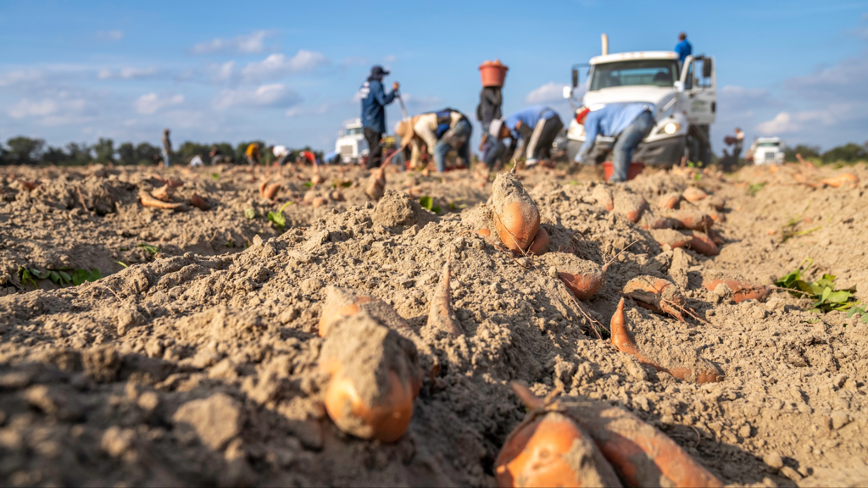Gleaning “Lost” Produce, an Avenue for Farmers to Give Back to the Community
go.ncsu.edu/readext?882778
en Español / em Português
El inglés es el idioma de control de esta página. En la medida en que haya algún conflicto entre la traducción al inglés y la traducción, el inglés prevalece.
Al hacer clic en el enlace de traducción se activa un servicio de traducción gratuito para convertir la página al español. Al igual que con cualquier traducción por Internet, la conversión no es sensible al contexto y puede que no traduzca el texto en su significado original. NC State Extension no garantiza la exactitud del texto traducido. Por favor, tenga en cuenta que algunas aplicaciones y/o servicios pueden no funcionar como se espera cuando se traducen.
Português
Inglês é o idioma de controle desta página. Na medida que haja algum conflito entre o texto original em Inglês e a tradução, o Inglês prevalece.
Ao clicar no link de tradução, um serviço gratuito de tradução será ativado para converter a página para o Português. Como em qualquer tradução pela internet, a conversão não é sensivel ao contexto e pode não ocorrer a tradução para o significado orginal. O serviço de Extensão da Carolina do Norte (NC State Extension) não garante a exatidão do texto traduzido. Por favor, observe que algumas funções ou serviços podem não funcionar como esperado após a tradução.
English
English is the controlling language of this page. To the extent there is any conflict between the English text and the translation, English controls.
Clicking on the translation link activates a free translation service to convert the page to Spanish. As with any Internet translation, the conversion is not context-sensitive and may not translate the text to its original meaning. NC State Extension does not guarantee the accuracy of the translated text. Please note that some applications and/or services may not function as expected when translated.
Collapse ▲Have you ever wondered about what happens to produce that farmers cannot harvest or sell? Gleaning is one potential avenue to bring “lost” fruits and vegetables back into our local food systems. Gleaning is the practice of collecting produce leftover in fields after farmers have harvested for market. Produce can be deemed not marketable if it does not meet retail standards, which can include characteristics such as size, shape, color, or amount of pest damage. These non-marketable fruits and vegetables (often called “seconds”), while not perfect, are just as nutritious and safe to eat compared to their retail counterparts when handled appropriately. These seconds can be harvested and donated to help provide fresh, healthy local produce to food insecure individuals who need it most.
Gleaning is a community effort, with farmers reaching out to organizations to coordinate volunteers as well as food pantries and food banks to pick up and distribute the produce. Gleaning can be a great activity for community groups, such as church congregations, work teams, and school groups, to engage in community service and to learn more about where their food comes from. Sweet potatoes are a common crop for gleaning, since many are not marketable based on being too small, too large, or irregularly shaped. They are also fun to harvest, since mechanized harvesting pulls up the root tubers and makes them easier for volunteers to gather. Some farmers opt to glean while harvesting, asking farm workers to separate retail grade and seconds at the same time, and coordinate with local food pantries and food banks to pick up their donations. Gleaning provides an avenue for farmers to donate their non-marketable produce which would otherwise rot in the field.
Several organizations can help connect farmers with gleaning volunteers. The Society of St. Andrews (SOSA) is a non-profit organization that helps to coordinate volunteers for gleaning across the state. SOSA has worked with several farms in Lee County over the years to donate produce to local food pantries and regional  food banks, including Blueberry Hill U-Pick, White Hill Farms, Gross Farms, and McNeill Farms. Extension Agents can also serve as connectors for farmers, food banks and pantries, and volunteer groups, acting to coordinate gleaning events or connecting farmers with organizations who assemble volunteers. This year, both Blueberry Hill U-Pick and White Hill Farms have coordinated with SOSA to have volunteers glean blueberries and sweet corn at their farms, respectively. N.C. Cooperative Extension and Christians United Outreach Center have also helped to coordinate blueberry gleaning events requested by a generous homeowner.
food banks, including Blueberry Hill U-Pick, White Hill Farms, Gross Farms, and McNeill Farms. Extension Agents can also serve as connectors for farmers, food banks and pantries, and volunteer groups, acting to coordinate gleaning events or connecting farmers with organizations who assemble volunteers. This year, both Blueberry Hill U-Pick and White Hill Farms have coordinated with SOSA to have volunteers glean blueberries and sweet corn at their farms, respectively. N.C. Cooperative Extension and Christians United Outreach Center have also helped to coordinate blueberry gleaning events requested by a generous homeowner.
Interested in getting involved with gleanings or need help organizing a group? You can reach out to N.C. Cooperative Extension or SOSA to help connect you with upcoming gleaning opportunities. For more information about gleaning and ways you can volunteer to help address food insecurity in our community, call the N.C. Cooperative Extension – Lee County Center and ask for Meredith Favre, the Local Foods Coordinator.
References
https://content.ces.ncsu.edu/farm-to-food-bank-resource-guide/gleaning
https://content.ces.ncsu.edu/gleaned-sweetpotatoes-storage-recipes-and-quick-facts
Meredith Favre is the Local Foods Agent for North Carolina Cooperative Extension in Lee County.




